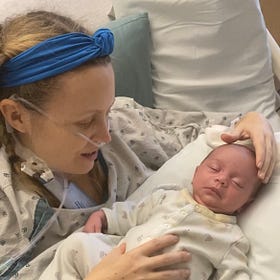The aHUS Patient Resource Guide
Made By Patients For Patients
This newsletter is a reader-supported publication. If you find value in this work, please consider becoming a paid subscriber. For the cost of a latte, paid subscriptions are the fuel that keeps me doing this work. Thank you for your support!
Good morning RDG community and aHUS community! As well as new patients and caregivers wandering in. Thank you for being here.
Ahead of aHUS Awareness day on September 24th, I wanted to create a reference doc for folks made from the patient point of view.
I get asked a lot of the same questions from folks looking for answers time and again, and this guide is my answer to that.
And I snagged another patient expert along for the project because two heads are better than one.
This is intended to be shared, revisited, and help answer common questions. As new information updates, I’ll do my best to keep it up to date.
The aHUS Patient Resource Guide
Dear Patient,
If one or more of your physicians mention the possibility of atypical Hemolytic Uremic Syndrome (aHUS), there is a lot to process.
I’ve been there.
After years of patient group questions and interfacing with common challenges around this disease, I wanted to create a resource for folks like FAQs, things you should ask your providers, and general disease guidance.
So I emailed Bethany Lovegrove and asked for her to team up with me to create this resource document. She runs a busy aHUS patient group online and has been incredibly active in aHUS advocacy herself for years.
I hope this serves other patients and caregivers in times of uncertainty. This disease is complicated and challenging, but luckily we have a treatment and outcomes are improving with advocacy and awareness.
Taylor
aHUS 101- The Basics
Is a doctor suddenly throwing a lot of terms your way? It can be daunting without an MD.
aHUS is a complicated rare disease with varying triggers, but generally speaking, in most cases aHUS is caused by a dysregulation of the complement system.
What is the complement system? Your immune system’s best friend. It works alongside it to fight disease.
Patients with aHUS are triggered by some kind of bodily stress event, causing an overactivation of the complement system leading to thrombotic microangiopathy (TMA) or micro-clots. These micro-clots commonly cause kidney damage, but other organs can be impacted.
We often see issues such as hemolytic anemia, low platelets, and kidney or other organ failure as well as many other varying symptoms.
It can be confusing, but atypical HUS is not typical HUS which is caused by E. coli. Your doctor may find it important to test for E. coli as well as ADAMTS13, to rule out HUS and TTP.
The complicated landscape of this disease has led the medical field to debate its name. Currently, you may find it also called Complement-Mediated Thrombotic Microangiopathy or CM-TMA. Variations like CM-HUS also exist.
Luckily, aHUS is one of the 5% of rare diseases with a treatment. So even though the disease comes with incredible challenges, there is a lot of hope.
More disease explainers can be found at:
Important Questions to Ask Your Doctor:
How many patients have you treated for aHUS?
This is a vital question. Due to its rare nature, many physicians are not familiar with aHUS. If this is the case and you don’t have access to other doctors, a good question to follow up would be “Would you consult with other aHUS experts?”
A list of experts can be found at the aHUS Alliance website and at the aHUS Foundation.
Who will be managing my care?
Likely a hematologist and/or nephrologist. Seek one or both out if you’re not being managed by them already.
How do you plan to treat my aHUS?
Currently, we have two standard treatments of complement inhibitors: eculizumab (Soliris) the two week dosage version or ravulizumab (Ultomiris) or the eight week dosage version. At disease onset or during a flare, whichever your medical team can access fastest is crucial.
We are seeing some advantages to the ravulizumab, which has one loading dose instead of five, but timeliness of any complement inhibitor is the most important factor.
Complement inhibitors are very effective and have been a game-changer in the treatment of the disease.
There are two biosimilars for eculizumab at this time: Bkemv (Amgen) and Epysqli (Samsung Bioepis & Teva). Unlike generic drugs that are exact copies of small-molecule drugs, biosimilars are complex biological medicines that cannot be copied precisely. These drugs are approved by the FDA.
Complement inhibitors have a black box warning for serious meningococcal infections. There are meningococcal vaccination requirements for patients who receive this treatment. Many patients may also be prescribed antibiotics while taking this drug. Learn more at the CDC website.
Some patients may need other forms of treatment depending on their genetic profile.
What labs will you be using to monitor my disease and how often?
We most commonly see these vital labs, if one is missing in your labwork, inquire with your provider: LDH (Lactate Dehydrogenase), CBC (platelets, hemoglobin) Complement (CH50 or Total, C3, C4), Comprehensive Metabolic Panel (kidney and liver function), haptoglobin, and urinalysis.
Bonus lab: soluble Membrane Attack Complex (sMAC) also known as sC5b-9.
For more information about labs, see the atypical HUS Foundation.
Will I need genetic testing?
Genetic testing for aHUS can be a valuable tool for diagnosis, risk assessment, and guiding treatment strategies. It helps pinpoint the specific genetic defect, allowing for more personalized and effective management of this rare and serious condition.
What do the genetic testing results mean?
Your doctor can give you specific interpretations, but here is what we know:
CFH (Complement Factor H):
Mutations in CFH are the most common, found in about 30% of aHUS cases. CFH is a protein that regulates the complement system, and its dysfunction can lead to uncontrolled complement activation. People with CFH are the most likely to relapse.
CD46 or MCP (Membrane Cofactor Protein):
Mutations in MCP are also relatively common, especially in patients with aHUS onset during childhood. MCP helps regulate the complement system on cell surfaces.
PLG (Plasminogen Gene):
PLG is a gene within the coagulation pathway that has also been linked to aHUS in some patients.
DGKE (Diacylglycerol Kinase Epsilon):
Mutations in DGKE are associated with an autosomal recessive form of aHUS.
Anti-CFH antibodies:
In some cases, aHUS can be caused by autoantibodies that target and neutralize CFH, leading to similar consequences as CFH gene mutations.
Other genes associated with aHUS include, but not limited to: C3, CFB, CFI, THBD. There are also RNA exosome genes that can mutate to cause aHUS.
NO KNOWN GENE:
So you have an aHUS diagnosis, but nothing comes up on your genetic testing. It could mean science just hasn’t discovered the mutation yet, so it doesn’t necessarily mean you’re genetically in the clear. It’s important to always be cautious even if you don’t confirm a gene. You may need to retest again if you come up without a genetic marker in a few years because science makes genetic advancements all the time.
You’re also not alone, 30-50% of patients with aHUS have no known genetic marker.
The University of Iowa is particularly helpful for performing and interpreting genetic testing results.
Will I need a kidney biopsy?
Many doctors may not require it depending on your kidney damage. A kidney biopsy is not required to make an aHUS or TMA diagnosis. For some kidney failure patients, their doctors may determine that it is necessary. Additionally, there is a chance TMA won’t show up even if there is activity according to kidney specialist Dr. Craig Shadur.
With kidney failure, how do you plan to monitor kidney function?
The common lab to monitor kidney function is creatinine or eGFR on the Comprehensive Metabolic Panel. You’ll want to have a plan for monitoring as well as a plan for dialysis if you are in kidney failure. With acute kidney damage, recovery is possible with good management.
Do I have to take antibiotics with my treatment?
It’s very common to take regular prophylactic antibiotics while on complement inhibitors to help protect patients from dangerous infection. This may be a shared decision with your doctor for many, especially for those with allergies.
Common Patient Concerns
In patient groups and spaces, we see folks debating many of the same issues. We gathered some questions that arise time and again for many patients.
My kidneys aren't showing signs of improving. What should I do?
Three to six months is common for kidneys to stabilize enough to get off dialysis after a flare and with treatment, but it can take much longer. Kidneys show recovery even over years. If you’re on treatment and find you’re not seeing progress in your labs, especially after six months, we recommend a second opinion from another nephrologist.
In the meantime, stay on treatment and follow all dietary and care-plan recommendations. You may need to adjust your dialysis cadence to help the kidneys recover. Kidneys are tricky and take a lot of patience.
Am I immunosuppressed due to treatment?
Yes, but eculizumab and ravulizumab are not general immunosuppressants. Patients are most vulnerable to meningococcal infections as well as some other infections. According to the Alexion site, “patients may have increased susceptibility to infections, especially with encapsulated bacteria, such as infections caused by Neisseria meningitidis but also Streptococcus pneumoniae, Haemophilus influenzae, and to a lesser extent, Neisseria gonorrhoeae. Children treated with ULTOMIRIS may be at increased risk of developing serious infections due to Streptococcus pneumoniae and Haemophilus influenzae type b (Hib).”
Although it should be noted upper respiratory tract infections are a common side effect of the drugs.
I’m considering discontinuing treatment? What are the risks?
The aHUS Alliance has a good resource post for considering going off treatment.
There may be a lot of risks. Considerations include your individual genetic marker, onset trigger, as well as kidney and other organ function.
Even if you are a good candidate to go off treatment, it’s crucial to monitor often with labs and urine test strips.
The FDA cautions, “patients with atypical hemolytic uremic syndrome (aHUS) who discontinue treatment must be closely monitored for at least 12 months for signs of thrombotic microangiopathy (TMA) complications. The decision to stop treatment should be individualized and carefully considered due to the risks of relapse.
Clinical symptoms of TMA to watch for include:
Changes in mental status
Seizures
Chest pain (angina)
Difficulty breathing (dyspnea)
Thrombosis (blood clots)
Increasing blood pressure”
How can a doctor help me make sure insurance approves the med?
These drugs often trigger denials and prior authorizations. Don’t be deterred. With your doctor's support, you can work to get this vital treatment.
Get an email for your doctor. When you meet, ask for their card. Build a rapport based on respect and trust. Don’t be shy about asking for their support when you need it.
If you’re pursuing or taking Soliris or Ultomiris, get on the ONE SOURCE system via Alexion.
Taylor has a Substack post about fighting insurance denials and prior authorization challenges if you need a resource into that process.
Where can I get assistance for copays and premiums?
Connect with Alexion’s OneSource patient support - Alexion has a copay program available.
Also check out The Assistance Fund as well as NORD’s assistance program.
What about clinical trials or future treatment options?
Right now, as of this article's publication, we know Novartis is testing a pill form of treatment called Iptacopan. A subcutaneous version called Crovalimab is being tested from Hoffman-La Roche. We also see Narsoplimab (Omeros) and Ruxoprubart (NovelMed) in the testing pipeline. Follow the aHUS Alliance for updates on future treatment options and trials.
Can I have more children after diagnosis?
This is an incredibly personal decision we see often. It may depend on your individualized outcome during your flare as well as your treatment plan. Quality high risk prenatal care is essential. Maternal fetal medicine specialist and aHUS expert Dr. Richard Burwick discussed this in a Q&A in Taylor’s Substack.
Am I going to die from aHUS?
It’s very common to hear about this disease and search immediately for mortality data. Before treatment, these rates were quite high. Thankfully now, patients have a chance at incredible outcomes with treatment. It’s a new chapter in hope for this disease.
As a patient, it’s not always helpful to focus too much on mortality rates. Every case is incredibly different. With good care, so much is possible.
Additional Resources:
https://www.ahusallianceaction.org/
Facebook Groups- adults and families
Here is a printable version of this guide:
Special thanks to Bethany Lovegrove - we both learned a lot working and collaborating on this guide. She’s an ardent patient advocate and does incredible work to support patients. Say hi to her on Facebook in the aHUS adult group and thank her for all her work.
Did this help? Let me know. Also if you have questions or updates (I know a lot of aHUS experts follow this Substack), let me know that too. Happy to change the doc as science and studies provide more info and context into this complicated disease.
Comment of the Week
“I did the research that Taylor used in her story. Von Gassers work has been covered on the aHUS alliance website for several years. The history is now being covered in a series of article called “Before aHUS Endeavours Fade” . Similarly there are many articles on the different HUSs plus articles on new names for them. This article is one that shows the cause of the confusion. atypical HUS name became more commonplace 25 years ago. Prior to that it was HUS/TTP predominantly and was discovered over 100 years ago as a “clumping disorder”.
Len Woodward
The History of aHUS - a mini-report on my disease
The story of my disease atypical Hemolytic Uremic Syndrome began not far from the photo of me above in Switzerland.
I had been wondering about the history behind this rare disease that awoke in my body and it all started much like my own story, with a little baby girl.
If you’re new here and wondering, “what happened to this lady?” read:
Welcome to my disease. What is atypical Hemolytic Uremic Syndrome (aHUS) or Complement-Mediated Thrombotic Microangiopathy (CM-TMA)?
Hi, If you’re new here, I started writing a book six months ago when I was on dialysis. It’s intended to be both memoir and a practical tool to help folks who might be going through something similar or those caregivers and family supporting someone with a challenging diagnosis. I hope to include excerpts here as I write. NOTE: This is not intended to r…
I started writing this when I was on dialysis. It’s intended to be both memoir and a practical tool to help folks who might be going through something similar or those caregivers and family supporting someone with a challenging diagnosis. NOTE: This is not intended to replace actual medical guidance. Please consult your doctors on your individual challenges and situations. Please talk to your clinicians before adjusting any of your care protocols. Also names have been changed for most of my medical staff.
THANK YOU, NEW PAID SUBSCRIBERS!
Thank you to Katie McUpton, Dienna D’Olimpio Harada, CC Couchois, Roy Lenn, and Dr. Richard Burwick for your founding level donation.



